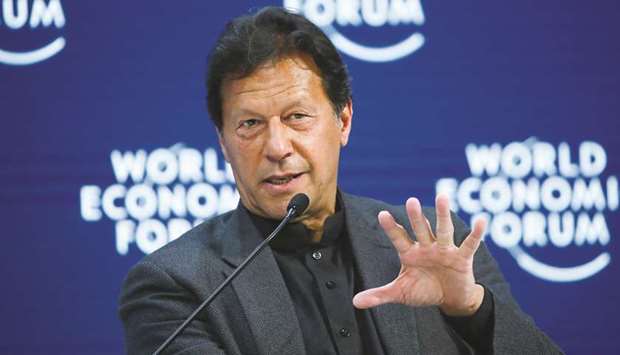Imran Khan has appeared on the cover of TIME magazine before when he was still aspiring to the country’s highest office, but the form is slightly more interesting this time.
His first outing in Davos as prime minister last week — he has been to the famous ski resort in the Swiss Alps as a distinguished WEF guest a few times before as well — made a splash in the US publication with respected global leaders for company. The Famous Five riding a chairlift, included Khan, World Economic Forum (WEF) Executive Chairman Klaus Schwab, German Chancellor Angela Merkel, Microsoft founder Bill Gates and European Central Bank President Christine Lagarde.
Khan, of course is not new to the spotlight having first tasted fame in the Sydney Test of 1976 as a genuine fast bowler, who would send the pulse racing in a magnificent career as one of cricket’s greatest ever all-rounders and captain, but slowly and surely, the Pakistani leader is now again becoming the international media’s poster boy in a different avatar.
There are some parallels to his past career though. He picked up a team of mostly disparate cricketers and turned it into a world beating force, culminating in that fairytale 1992 Oceania triumph. His star dust in the new avatar again comes in the backdrop of a struggling economy where the country appeared in dire straits when he assumed power.
He is now gaining global attention as a profound peacemaker, battling Islamophobia with a clarion call for better understanding of Islam in the West, and raising a resonant pitch for the world powers to assume climate change responsibility.
The trouble is he has too much on his plate and it shows — while Khan is in demand wherever he trots on the globe, he has considerable challenges at home where he is up against an old order, long used to milking the nation’s resources for personal benefit. The opposition is in a bit of a disarray with its top leaders either convicted of corruption or facing the law for alleged abuse of power, but still capable of putting a spoke in the wheels of change that Khan is defiantly trying to steer.
The peculiar ways of power politics in the sub-continent means despite having coalition governments in three of the four provinces, including one with a thin majority in Punjab — the key to holding power in the Centre as well — allows Khan little wiggle room. Yet, upon his return from Davos, the PM sacked three of his relatively close aides and ministers in the Khyber-Pakhtunkhwa province because they were threatening to bring down the chief minister in intra-party jockeying for greater spoils.
The media — also used to flirting with the party in power — is now at the receiving end of a government unwilling to bend. An unhappy media — the electronic is pretty large and a vibrant, if loud, one — continue to ‘scrutinise’ him and his party like never before in the country’s history. All of these pressures and pulls make governance even more pronouncedly, difficult.
But reminiscent of his heydays in cricket — coming to the party when the chips were down — Khan is dead-batting the crisis, manfully. Likely, the form comes from his prowess in Davos where he spoke passionately about good governance being the cornerstone of his ambition to change Pakistan’s direction for the better.
Not shy of admitting reversals, he noted: “Sadly, our governance deteriorated in the last 30 years. That is one of the biggest reasons we have not been able to fulfil our potential as a country. We had the biggest fiscal deficit when my party came into power one-and-a-half years ago. From now on, my biggest challenge is how we can improve our state institutions so we can improve our governance —so we can tap our potential.”
On the state of economy, he had a few healthy percentages to draw the card. “Mercifully, the rupee has gained, the stock market has gone up, the current fiscal deficit has reduced by 75% and foreign investment jumped by 200% in the last year alone. We still have a lot of work to do, but we are (headed) in the right direction.”
But the Pakistani leader began his Davos rendezvous, which marked the 50th anniversary of the WEF, by reinforcing the strong message on climate change. Khan said his government intended to plant 10bn trees over the next four years. He observed that the forestation was crucial not only because Pakistan was vulnerable to the effects of global warming but also because pollution had a become a “silent killer” across cities.
As he spoke on the need to protect environment, the PM reminded the world of his country’s natural beauty. “What I loved about Pakistan was its wilderness, its mountains. With age, I saw this wilderness disappear. I always resolved that I would make sure that we preserve the God-given beauty of this country”. He was also bullish about attracting a large number of tourists this year with some of the leading entities — luxury travel magazine Conde Nast, for instance — declaring Pakistan as the No.1 tourist destination for 2020.
Khan also pushed for peace with India by urging world powers, including the US, and UN to play its role in preventing conflict. On the sidelines of the WEF, the Pakistani leader met US President Donald Trump — the third time he had met him in seven months since his first White House outing in July last year — to raise the Kashmir issue, build on Islamabad’s engagement with Washington for peace in Afghanistan and prevent escalation of US-Iran tensions.
Khan and Trump had a media interaction before going into a detailed meeting. The PM also made an important reiteration of Pakistan’s future foreign policy goals. Admitting that involvement in the war-on-terror, even if on the world’s behalf, was a mistake for the colossal damage it wrought on Pakistan’s economy, Khan underlined the paradigm shift by saying Islamabad would no longer get involved in any conflict.
“From now onwards, Pakistan will only partner another country in peace. We would not become part of any other conflict,” the PM said, before adding that recently, Islamabad had played its part in helping defuse tensions between the US and Iran as well as Saudi Arabia and Iran.
The PM was also sanguine about the potential of trade once ties with India were normalised. “The moment Pakistan-India relationship becomes normal and trade starts between the two countries, immense opportunities for growth will emerge”.
The writer is Features Editor. He tweets @kaamyabi

RESONANT PITCH: Pakistan Prime Minister Imran Khan making a point during his speech at the World Economic Forum in Davos last week. Reuters

